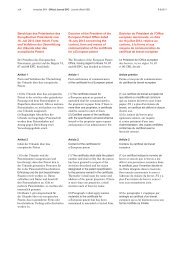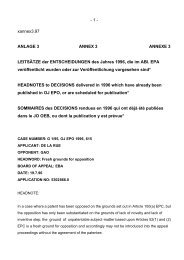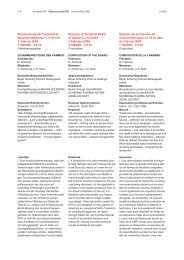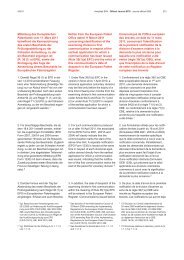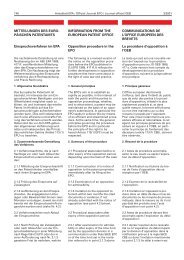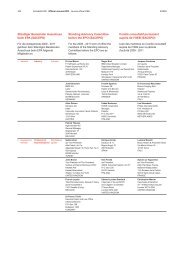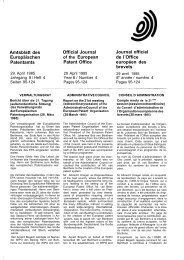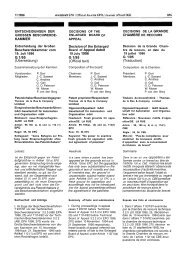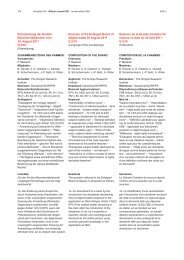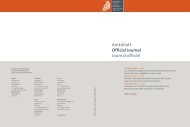Entscheidung der Großen Beschwerdekammer vom 23. Juli 2012 G ...
Entscheidung der Großen Beschwerdekammer vom 23. Juli 2012 G ...
Entscheidung der Großen Beschwerdekammer vom 23. Juli 2012 G ...
You also want an ePaper? Increase the reach of your titles
YUMPU automatically turns print PDFs into web optimized ePapers that Google loves.
4/2013 Amtsblatt EPA Official Journal EPO Journal officiel OEB 209<br />
Vertrauen auf die erteilten Ansprüche<br />
darauf verzichten, Einspruch einzulegen,<br />
und nach <strong>der</strong> Berichtigung feststellen,<br />
dass das Patent ihre Interessen gefährdet,<br />
sie aber <strong>der</strong> Einspruchsmöglichkeit<br />
beraubt sind. Ebenso wenig würde<br />
gegen den Grundsatz <strong>der</strong> Gleichbehandlung<br />
<strong>der</strong> Beteiligten verstoßen, weil <strong>der</strong><br />
Patentinhaber nicht mehr die Möglichkeit<br />
hätte, ein mehrseitiges Verfahren, in<br />
dem über eine für den Einspruch maßgebliche<br />
Frage entschieden wird, nämlich<br />
über den Inhalt des Patents, in ein<br />
einseitiges Verfahren umzuwandeln.<br />
8. Im Übrigen ist die Große <strong>Beschwerdekammer</strong><br />
<strong>der</strong> Meinung, dass die fehlende<br />
Möglichkeit, eine Berichtigung des<br />
Patents nach Regel 140 EPÜ zu beantragen,<br />
den Patentinhaber keineswegs<br />
benachteiligt. Wenn nämlich eine Berichtigung<br />
offensichtlich ist (was sie sein<br />
muss, um Regel 140 EPÜ zu genügen),<br />
dann kann sie – wie von <strong>der</strong> Beschwerdegegnerin/Patentinhaberin<br />
vorgebracht<br />
(s. vorstehende Nr. VI.2) – nicht überraschend<br />
sein und keine nachteiligen Wirkungen<br />
für Einsprechende o<strong>der</strong> Dritte<br />
haben, weil alle Betroffenen das Patent<br />
so lesen, als ob es berichtigt wäre, und<br />
es einer tatsächlichen Berichtigung gar<br />
nicht bedarf. Wenn eine Berichtigung<br />
dagegen nicht sofort offensichtlich ist,<br />
dann dürfte sie ohnehin nicht nach<br />
Regel 140 EPÜ zugelassen werden,<br />
weil diese Regel nur die Berichtigung<br />
"offenbarer Unrichtigkeiten" erlaubt.<br />
9. Nach Auffassung <strong>der</strong> <strong>Großen</strong><br />
<strong>Beschwerdekammer</strong> stehen dem<br />
Patentanmel<strong>der</strong> (bzw. später dem<br />
Patentinhaber) angemessene Mittel<br />
zur Verfügung, um auch ohne den Rückgriff<br />
auf Regel 140 EPÜ sicherzustellen,<br />
dass sein erteiltes Patent genau die<br />
gewünschte Fassung hat. Sollte ein<br />
Anmel<strong>der</strong> irgendwann bis hin zu dem<br />
Zeitpunkt, zu dem er sein endgültiges<br />
Einverständnis mit dem Wortlaut des<br />
Patents erklärt, in einer von ihm eingereichten<br />
Unterlage einen Fehler machen<br />
(o<strong>der</strong> einen früher begangenen Fehler<br />
übersehen), indem er z. B. in einem<br />
während des Prüfungsverfahrens eingereichten<br />
geän<strong>der</strong>ten Anspruch ein Wort<br />
falsch schreibt o<strong>der</strong> ein falsches Wort<br />
verwendet, so kann dieser Fehler vor<br />
<strong>der</strong> Erteilung gemäß Regel 139 EPÜ<br />
auf Antrag berichtigt werden.<br />
will be no question of denying the<br />
principle of equal treatment of parties<br />
through the possibility for a patentee to<br />
turn inter partes proceedings into ex<br />
parte proceedings on an issue – the<br />
content of the patent – which is decisive<br />
for an opposition.<br />
8. Further, the Enlarged Board consi<strong>der</strong>s<br />
that the absence of a possibility to<br />
request patent corrections un<strong>der</strong><br />
Rule 140 EPC should not prejudice<br />
patent proprietors. If on the one hand a<br />
correction would be obvious (as it should<br />
be to satisfy Rule 140 EPC) then, as the<br />
respondent proprietor submitted (see<br />
section VI.2 above), there can be no<br />
surprise and no adverse effect on opponents<br />
or others, because all concerned<br />
should read the patent as if corrected<br />
and an actual correction should not be<br />
necessary. If on the other hand a correction<br />
would be less than immediately<br />
obvious, then it should not in any event<br />
be allowed un<strong>der</strong> Rule 140 EPC which<br />
is confined to correction of "obvious<br />
mistakes".<br />
9. In the Enlarged Board's judgment a<br />
patent applicant (or, subsequently, a<br />
patent proprietor) has adequate means<br />
at his disposal to ensure his patent as<br />
granted is in the exact form he wants<br />
it to be without any need to invoke<br />
Rule 140 EPC. Should an applicant, at<br />
any stage up to and including the final<br />
approval by him of the text of his patent,<br />
make a mistake (or overlook a mistake<br />
he has previously made) in a document<br />
he has filed – for example, he mis-spells<br />
a word or uses an incorrect word in an<br />
amended claim which he files in the<br />
course of examination proceedings –<br />
then before grant that mistake can be<br />
corrected un<strong>der</strong> Rule 139 EPC on<br />
request.<br />
tions du brevet délivré, à former une<br />
opposition, ne pourra constater, après<br />
une rectification, qu'il est menacé par le<br />
brevet et qu'il n'a plus aucun moyen de<br />
faire opposition. Enfin, le principe de<br />
l'égalité de traitement des parties ne<br />
pourra pas être mis en cause puisque<br />
le titulaire du brevet ne pourra pas transformer<br />
une procédure inter partes en<br />
procédure ex parte sur une question,<br />
en l'occurrence le contenu du brevet,<br />
qui est décisive pour une opposition.<br />
8. La Grande Chambre de recours<br />
estime en outre que l'impossibilité de<br />
requérir la rectification d'un brevet au<br />
titre de la règle 140 CBE ne devrait pas<br />
porter préjudice aux titulaires de brevet.<br />
En effet, si une rectification est manifeste<br />
(elle doit l'être pour que les conditions<br />
de la règle 140 CBE soient remplies),<br />
les opposants ou les tiers ne peuvent<br />
pas être pris au dépourvu ni subir de<br />
préjudice, ainsi que le titulaire du brevet<br />
(intimé) l'a fait valoir (cf. point VI.2<br />
ci-dessus), puisque toutes les personnes<br />
concernées devraient lire le brevet<br />
comme s'il avait été rectifié et qu'une<br />
rectification effective ne devrait pas être<br />
nécessaire. Si, en revanche, une rectification<br />
n'est pas d'emblée manifeste,<br />
elle ne doit pas, en tout état de cause,<br />
être admise au titre de la règle 140 CBE,<br />
cette disposition étant limitée à la rectification<br />
d'"erreurs manifestes".<br />
9. Selon la Grande Chambre de recours,<br />
un demandeur de brevet (ou, ultérieurement,<br />
le titulaire d'un brevet) dispose de<br />
moyens adéquats pour s'assurer que<br />
son brevet tel que délivré revêt exactement<br />
la forme souhaitée, sans qu'il soit<br />
nécessaire d'invoquer la règle 140 CBE.<br />
Si un demandeur, à un stade quelconque,<br />
y compris jusqu'à ce qu'il donne<br />
son accord définitif sur le texte de son<br />
brevet, commet une erreur (ou ne<br />
détecte pas une erreur qu'il a faite<br />
précédemment) dans un document qu'il<br />
a produit, par exemple s'il a mal orthographié<br />
un mot ou s'il a utilisé un mot<br />
impropre dans une revendication modifiée<br />
qu'il dépose pendant la procédure<br />
d'examen, cette erreur peut être corrigée<br />
sur requête au titre de la règle 139 CBE,<br />
avant que le brevet ne soit délivré.



